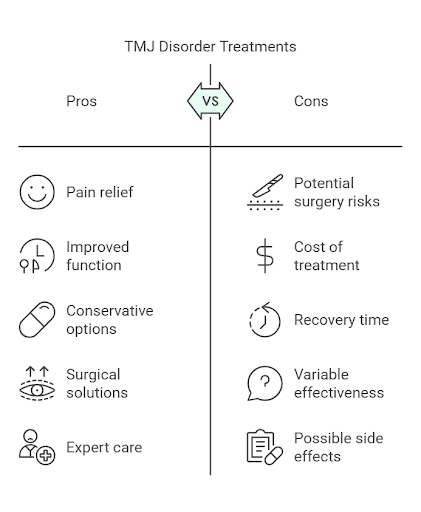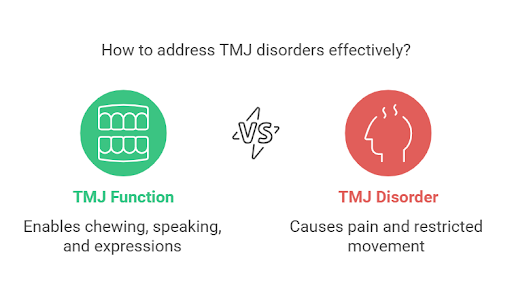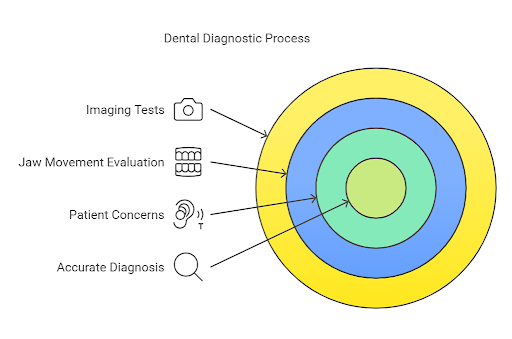Temporomandibular Joint (TMJ) disorders can cause significant discomfort, affecting basic functions like eating, talking, and even sleeping. The TMJ, the only movable joint in the face, connects the lower jaw to the skull. Like any joint, it can experience wear and tear or develop conditions such as Myofascial Pain Dysfunction Syndrome (MPDS), internal derangement, or arthritis. At Dental Excellence, we are dedicated to diagnosing and treating TMJ disorders with precision and care, offering both conservative and surgical solutions to improve your quality of life.

Understanding TMJ Disorders
What is the TMJ?

The temporomandibular joint acts as a hinge, enabling the movement of the lower jaw. It plays a vital role in essential functions like chewing, speaking, and facial expressions. TMJ disorders occur when the joint or surrounding muscles malfunction, leading to pain, restricted movement, or clicking sounds.
Common TMJ Disorders
- Myofascial Pain Dysfunction Syndrome (MPDS): Chronic muscle pain in the jaw, neck, and shoulders.
- Internal Derangement: Misalignment or displacement of the joint disc.
- Arthritis: Inflammation of the TMJ due to osteoarthritis or rheumatoid arthritis.
- TMJ Ankylosis: Near-total or total immobility of the jaw due to fusion of the joint.
For patients experiencing severe jaw immobility, visit our specialized Painless Root Canal Treatment page for related restorative options.
Causes and Symptoms
Causes of TMJ Disorders
- Teeth grinding or clenching (bruxism): Commonly linked with stress, it places excessive pressure on the TMJ. Learn how stress impacts dental health on our Bad Habits That Can Worsen Your Kid’s Dental Health page.
- Trauma or injury: A physical injury to the jaw or joint can lead to long-term issues.
- Arthritis or inflammatory diseases: Conditions like rheumatoid arthritis can affect the TMJ.
- Poor posture: Especially in the neck and jaw, it can strain the TMJ.
Symptoms of TMJ Disorders
- Jaw pain or tenderness.
- Clicking or popping sounds during movement.
- Difficulty opening or closing the mouth.
- Lockjaw or stiffness in the jaw.
- Headaches or earaches.
Diagnosing TMJ Disorders

At Dental Excellence, accurate diagnosis begins with a thorough examination. Our team evaluates your jaw movements, listens to your concerns, and may recommend imaging tests such as X-rays, CT scans, or MRI to understand the joint’s structure and condition.
For more on diagnostic expertise, explore our Advanced Infrastructure page.
Treatment Options for TMJ Disorders
1. Conservative Treatments
Our primary focus is on non-invasive methods to relieve discomfort and promote long-term joint health:
- Lifestyle Modifications: Avoid hard foods, improve posture, and manage stress.
- Physical Therapy: Exercises to strengthen jaw muscles and improve flexibility.
- Medication: Pain relievers, anti-inflammatories, and muscle relaxants.
- Splints or Mouthguards: Custom devices to prevent teeth grinding and reduce stress on the TMJ.
Discover related solutions on our Orthodontic Treatment Braces page.
2. Surgical Treatments
For severe cases, surgical intervention may be necessary to restore jaw function:
- Arthrocentesis: Flushing the joint to remove debris and reduce inflammation.
- Arthroscopy: A minimally invasive procedure to repair or remove damaged tissue.
- Open-Joint Surgery: For complex cases like TMJ Ankylosis, where the joint is immobile.
Explore how surgical and cosmetic interventions are part of our care on the Smile Makeovers page.
Managing TMJ Ankylosis
Patients with TMJ Ankylosis often experience severe difficulty moving their jaw. At Dental Excellence, we employ a combination of surgical intervention and physiotherapy to restore mobility and improve overall quality of life. Early treatment is crucial for optimal results.
Why Choose Dental Excellence?
- Personalized Care: Focused on understanding your unique needs.
- Expertise: Skilled in both conservative and surgical TMJ treatments.
- Advanced Technology: State-of-the-art diagnostic tools and treatment facilities.
Visit our About Us page to learn more about our expert team.
FAQs About TMJ Disorders
- How can I tell if I have TMJ issues?
Look out for symptoms like jaw pain, clicking sounds, or difficulty opening your mouth. A dental evaluation can confirm the diagnosis. - Are TMJ disorders permanent?
Not always. Many conditions can be managed effectively with early diagnosis and treatment. - Can untreated TMJ disorders lead to complications?
Yes, ignoring TMJ disorders can worsen pain, lead to jaw immobility, and even cause long-term damage to the joint.
Conclusion
If you are experiencing discomfort in your jaw or suspect a TMJ disorder, don’t wait to seek help. At Dental Excellence, we offer a comprehensive approach to diagnosing and treating TMJ conditions with the goal of restoring comfort and function.
- Schedule a Consultation Now: Contact Us
- Call Us: 0172 4631143, +91-9780459844
- Visit Us: SCF 43, 1st Floor Phase 3B2, Sector 60 Mohali (160059)
Take the first step toward a pain-free, confident life today!


